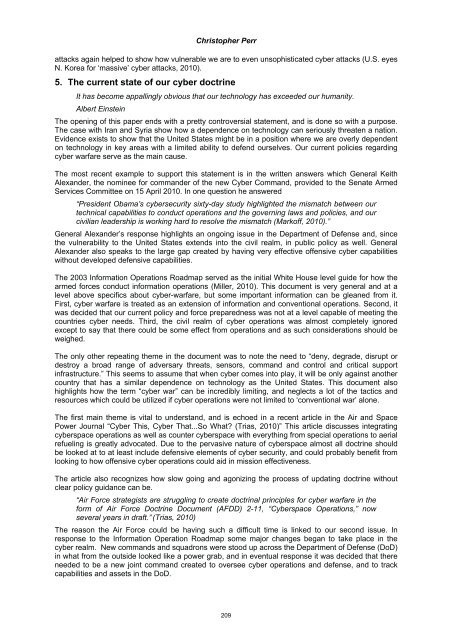6th European Conference - Academic Conferences
6th European Conference - Academic Conferences
6th European Conference - Academic Conferences
Create successful ePaper yourself
Turn your PDF publications into a flip-book with our unique Google optimized e-Paper software.
Christopher Perr<br />
attacks again helped to show how vulnerable we are to even unsophisticated cyber attacks (U.S. eyes<br />
N. Korea for ‘massive’ cyber attacks, 2010).<br />
5. The current state of our cyber doctrine<br />
It has become appallingly obvious that our technology has exceeded our humanity.<br />
Albert Einstein<br />
The opening of this paper ends with a pretty controversial statement, and is done so with a purpose.<br />
The case with Iran and Syria show how a dependence on technology can seriously threaten a nation.<br />
Evidence exists to show that the United States might be in a position where we are overly dependent<br />
on technology in key areas with a limited ability to defend ourselves. Our current policies regarding<br />
cyber warfare serve as the main cause.<br />
The most recent example to support this statement is in the written answers which General Keith<br />
Alexander, the nominee for commander of the new Cyber Command, provided to the Senate Armed<br />
Services Committee on 15 April 2010. In one question he answered<br />
“President Obama’s cybersecurity sixty-day study highlighted the mismatch between our<br />
technical capabilities to conduct operations and the governing laws and policies, and our<br />
civilian leadership is working hard to resolve the mismatch (Markoff, 2010).”<br />
General Alexander’s response highlights an ongoing issue in the Department of Defense and, since<br />
the vulnerability to the United States extends into the civil realm, in public policy as well. General<br />
Alexander also speaks to the large gap created by having very effective offensive cyber capabilities<br />
without developed defensive capabilities.<br />
The 2003 Information Operations Roadmap served as the initial White House level guide for how the<br />
armed forces conduct information operations (Miller, 2010). This document is very general and at a<br />
level above specifics about cyber-warfare, but some important information can be gleaned from it.<br />
First, cyber warfare is treated as an extension of information and conventional operations. Second, it<br />
was decided that our current policy and force preparedness was not at a level capable of meeting the<br />
countries cyber needs. Third, the civil realm of cyber operations was almost completely ignored<br />
except to say that there could be some effect from operations and as such considerations should be<br />
weighed.<br />
The only other repeating theme in the document was to note the need to “deny, degrade, disrupt or<br />
destroy a broad range of adversary threats, sensors, command and control and critical support<br />
infrastructure.” This seems to assume that when cyber comes into play, it will be only against another<br />
country that has a similar dependence on technology as the United States. This document also<br />
highlights how the term “cyber war” can be incredibly limiting, and neglects a lot of the tactics and<br />
resources which could be utilized if cyber operations were not limited to ‘conventional war’ alone.<br />
The first main theme is vital to understand, and is echoed in a recent article in the Air and Space<br />
Power Journal “Cyber This, Cyber That...So What? (Trias, 2010)” This article discusses integrating<br />
cyberspace operations as well as counter cyberspace with everything from special operations to aerial<br />
refueling is greatly advocated. Due to the pervasive nature of cyberspace almost all doctrine should<br />
be looked at to at least include defensive elements of cyber security, and could probably benefit from<br />
looking to how offensive cyber operations could aid in mission effectiveness.<br />
The article also recognizes how slow going and agonizing the process of updating doctrine without<br />
clear policy guidance can be.<br />
“Air Force strategists are struggling to create doctrinal principles for cyber warfare in the<br />
form of Air Force Doctrine Document (AFDD) 2-11, “Cyberspace Operations,” now<br />
several years in draft.” (Trias, 2010)<br />
The reason the Air Force could be having such a difficult time is linked to our second issue. In<br />
response to the Information Operation Roadmap some major changes began to take place in the<br />
cyber realm. New commands and squadrons were stood up across the Department of Defense (DoD)<br />
in what from the outside looked like a power grab, and in eventual response it was decided that there<br />
needed to be a new joint command created to oversee cyber operations and defense, and to track<br />
capabilities and assets in the DoD.<br />
209

















